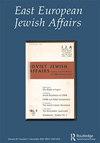Songs in Dark Times: Yiddish poetry of struggle from Scottsboro to Palestine
IF 0.2
4区 哲学
Q2 HISTORY
引用次数: 4
Abstract
Which Yiddish past ought to inform contemporary Jewish values? This is the question Amelia M. Glaser sets out to answer in her intricate study of selected “Yiddish poetry of struggle” published in the 1930s in Communist-aligned periodicals. Glaser argues that these poems, borne out of solidarity with the global proletariat, make their non-Jewish subjects “metaphorically Jewish” through the use of “passwords” situated within Yiddish discourse—for instance, kateyger (“accusing angel”) to characterize the prosecutor of an accused Italian anarchist. For Glaser, formally complex techniques to admit non-Jewish “Others” into a Jewish fold constitute both a literary act of moral resistance against the ruling classes, and a positive expression of Jewish identity. Divided into six chapters, the book offers analyses of Yiddish poems that express solidarity with the executed anarchists Sacco and Vanzetti, Palestinian Arabs in Mandate-era Hebron, massacred Chinese workers, lynched African-Americans, the anti-fascist brigades in the Spanish Civil War, and the peasant figures of Ukraine’s national writer, Taras Shevchenko. At the book’s chronological close, Yiddish poems of teshuva (return) express solidarity with Jewish victims of genocide. The book concludes with a small corpus of expertly translated complete poems. “The Yiddish poets whose verse filled Communist Party journals during the long 1930s,” Glaser writes,黑暗时代的歌曲:从斯科茨伯勒到巴勒斯坦的意第绪语斗争诗歌
哪些意第绪语的过去应该影响当代犹太人的价值观?这就是阿米莉亚·m·格拉泽(Amelia M. Glaser)在她对20世纪30年代发表在与共产党结盟的期刊上的“意第绪语斗争诗歌”进行的复杂研究中要回答的问题。格拉泽认为,这些诗歌是出于对全球无产阶级的团结,通过使用意第绪语中的“密码”,使非犹太人的主题“隐喻性地犹太人”——例如,用kateyger(“指控天使”)来描述被指控的意大利无政府主义者的检察官。对格拉泽来说,接纳非犹太“他者”进入犹太群体的复杂技术,既构成了对统治阶级的道德抵抗的文学行为,也构成了对犹太人身份的积极表达。这本书分为六个章节,对意第绪诗进行了分析,这些诗表达了对被处决的无政府主义者萨科和万泽蒂、在希布伦的巴勒斯坦阿拉伯人、被屠杀的中国工人、被私刑处死的非裔美国人、西班牙内战中的反法西斯旅以及乌克兰民族作家塔拉斯·舍甫琴科的农民形象的声援。在该书按时间顺序排列的结尾处,意第绪语诗歌“回归”表达了对种族灭绝犹太受害者的声援。这本书的结尾是一小部分经过专业翻译的全集诗歌。“在漫长的20世纪30年代,意第绪语诗人的诗歌充斥着共产党的期刊,”格拉泽写道,
本文章由计算机程序翻译,如有差异,请以英文原文为准。
求助全文
约1分钟内获得全文
求助全文

 求助内容:
求助内容: 应助结果提醒方式:
应助结果提醒方式:


